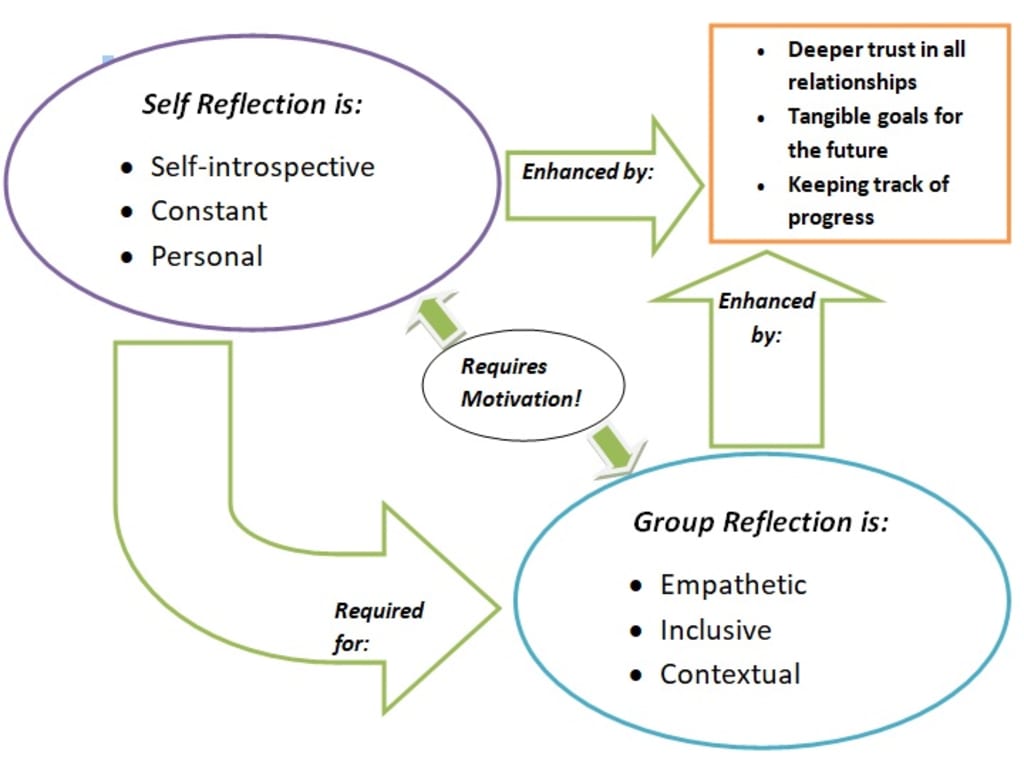
Hi! My name is Seven (yup, just like the number).
I support startups in an array of areas—rough sleeping, fashion design, and most important to me: the power of young people! I'm a Generation Z Consultant in the UK, and love to understand how this generation is going to change the world. I also currently support charities in the education and mental health sectors.
I am a social entrepreneur, a storyteller, and an advocate for HUGS. Seriously—I think we all need to show each other more love. That's why my interests are so diverse. And I'll probably be talking about all of them at some point.
The most important skill to me as a young social entrepreneur, is the skill to reflect. To look back, understand, and act differently next time - to view every outcome as either a success or a learning experience.
Although I’ve called it a skill (because doing it effectively is fairly skillful), it’s usually an action taken by someone who consciously wants to reflect on something that has happened. One could use this in their personal life, professional life, anytime, anywhere.
“Life can only be understood backwards; but it must be lived forwards." —Søren Kierkegaard
You’ll need a couple things to do it effectively though. Most importantly, you need to be honest and realistic with yourself, and you also need to genuinely want to grow, and be open to making changes in your life.
I remember being 15 years old, and all I could talk about was wanting to help other people, change the system, and express how awful I thought things were.
The problems here were twofold. Firstly, this was unrealistic because I wasn’t doing anything that would have a real impact on anyone.
But secondly, and most importantly, what I was really expressing here was that I wasn’t happy; I wasn’t happy with myself, what I was doing, my abilities, or my choices, and what people kept telling me (which eventually sunk in) is that if you can’t help yourself, how can you expect to be able to do anything for anyone else?
We aren’t able to, not just out of some base selfishness, but because we’ll be naturally occupied with changing, perhaps even subconsciously. And the most important step to understanding, helping, and changing ourselves is reflection, because it gives you the chance to analyse one aspect of your past – a decision made or action taken—and really understand whether you liked it and what to do about it.
“If there is no enemy within yourself, there can be no enemy outside your doors.”—Very rough translation of a Nepalese proverb.
When you think about it that way, it starts to seem kind of obvious. Before you’ve made any change in your life, before anyone has, even in stories or movies, they need to realise it first. Realise the problem, or the consequences of an action, and then start thinking about what else to do.
There’s only one small difference here: reflection is conscious. If you have the desire to reflect, you consciously remind yourself that you want to look back on the consequences of your decisions and your actions, as opposed to waiting around for them to negatively impact you because you did something without really thinking about it.
The little diagram you see above is something I developed over time to express how many different factors are at play here.
As you can see, I’ve listed certain things as required for self-reflection and group reflection (important for teamwork in a professional scene), the latter of which is only really going to get anywhere if individual members of a group are able to do the former. There are also certain things, such as trust, which can make any of the things on either little list easier to grasp, complete, and live out. Although some of this is easier said than done, it might be worth exploring how each individual point relates to your life, and trying to work on each point little by little.
Most important here is motivation, which I mentioned earlier. Honestly, it matters for a lot more than just this—if you aren’t motivated, doing something that is done to break a habitual pattern will become exponentially harder.
It’s also worth noting that a lot of these points (even separately) are particularly useful for professional growth, even though I believe they should be applied to the personal life first. Doing this, even if some of it still needs a lot of work, has helped transform me into someone who is constantly trying to improve and is better off for it.
So, here’s some extra food for thought. How important is self-introspection? Introspection is essentially the ability to look inwards towards something, to learn about it and grow as a result. So self-introspection is very similar to what good reflection would be, when looking at your own actions.
Getting a good grasp over it means that you’ll not only be more equipped to learn from your experiences, you’ll also show greater motivation and willingness to grow and adapt. It’s importance is to the point where I don’t feel comfortable working in a team, and definitely wouldn’t accept someone onto a team, if they couldn’t show at least fairly well that they were introspective.
When telling that to CEOs, managers, and the like, they all express how important they think it is (and look damn surprised), and say that they don’t usually think about introspection. It’s like a small revelation to some people.
I remain, Seven.






Comments
There are no comments for this story
Be the first to respond and start the conversation.